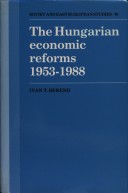Cambridge Russian, Soviet and Post-Soviet Studies
1 total work
Professor Berend presents a comprehensive inside account of Hungary's economic reforms since the 1950s. Working from Communist Party archives, which have hitherto partially remained closed to scholars, Berend situates the history of these economic reforms within their political context, looking in particular at the role of the Soviet Union. He examines the theoretical background to reform, the obstacles that arose during implementation and the gradual realisation that minor reforms of the old system could no longer work. The Hungarian Economic Reforms 1953–1988 comes at a time when many centrally planned economies are examining their performance and structure and seeking suitable forms of change. The Hungarian reforms have attracted those countries wishing to rid themselves of their Stalinist command economies. Thus the book indirectly sheds light upon Chinese economic reforms and on Gorbachev's Soviet perestroika. It will be of interest to specialists and students of East European studies, with special reference to the EMEA, planned economies and economic reform.
